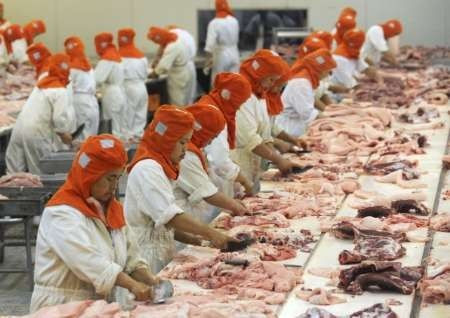China Trumps US In Meat Consumption, But May Soon Pay The Price

Vegetarianism might not be such a bad idea in China these days.
The world’s most populous country now consumes 71 million tons of meat every year, according to the Telegraph. That’s twice the total amount of meat consumed in the U.S. -- and one-quarter of the entire world’s supply.
This development is mostly due to the simple fact that China is home to more than a billion people. The average American still consumes more meat than the average Chinese. But the fact remains that the domestic supply of meat in the People’s Republic of China is simply not keeping up with demand.
One agricultural expert -- Wen Tiejun, dean of the Renmin University of China's School of Agriculture & Rural Development -- told the Telegraph that this is a worrisome situation.
“It is not possible to feed everyone so much meat," Wen said. "People must simply eat less.”
If they don’t, China will be increasingly reliant on imports from other meat producers such as Brazil and the U.S. Already, the PRC is importing abnormally high volumes of corn and soybeans just to feed its own domestic animals.
China’s meat consumption hasn’t always been this high. In fact, it has skyrocketed only over the past two decades. Rapid economic development has played a major role, according to a Kansas State University report last year.
“Increased income levels have led consumers away from a plant-based protein diet toward an animal-based protein diet,” the report's authors said.
This move has something to do with changing preferences and a greater ability to purchase high-quality meats, but it is also a function of the growing prevalence of Western restaurant chains.
“Western-style restaurants are becoming prominent in China. McDonald’s has nearly 1,100 outlets in China and plans to boost that number to 2,000 within the next three years. Yum Brands Inc., which owns KFC and Pizza Hut, among other chains, is the largest Western-style fast-food group in China,” the report's authors wrote.
It’s easy for China to import a fast-food franchise, but not so easy to import agricultural practices when only 14 percent of its land is arable. As Wen explained, that could have a real impact on the country’s fiscal solvency.
“The more you import energy, food and raw materials, the more you have a supply problem like Japan," Wen said. "Because Japan and South Korea rely so much on imports, they have no control over their economies.”
© Copyright IBTimes 2024. All rights reserved.






















